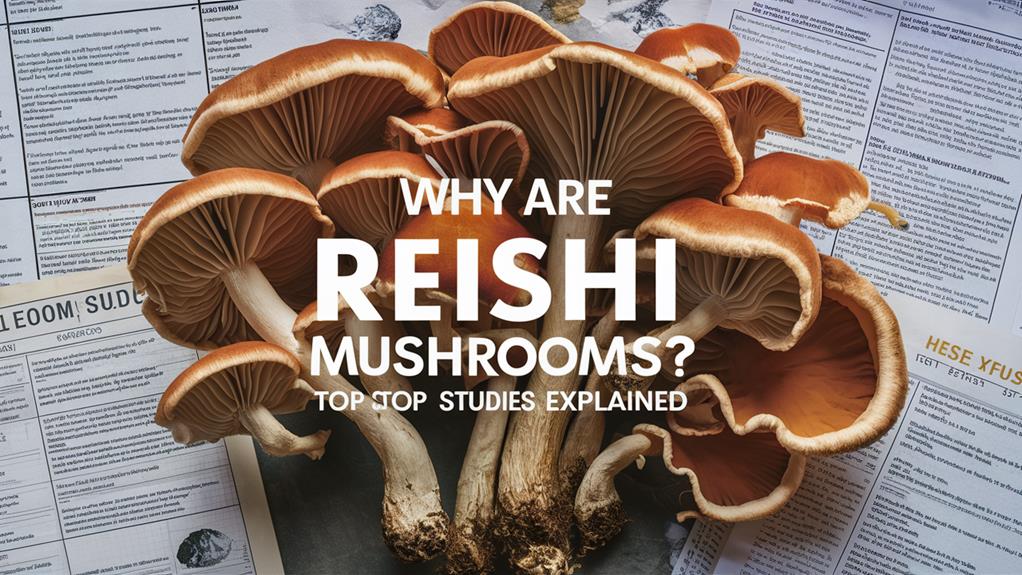
Reishi mushrooms, known as the "mushroom of immortality," provide numerous health benefits backed by significant research. They're especially recognized for boosting your immune system, helping to fight illnesses, and enhancing cancer treatment outcomes. These mushrooms support cardiovascular health by lowering cholesterol and improving blood glucose levels, making them beneficial for diabetes management. Reishi also contains antioxidants that combat oxidative stress, promoting healthy aging. While they're generally safe, be mindful of potential side effects. With ongoing studies, researchers are uncovering even more advantages of this powerful mushroom, hinting at exciting possibilities for future health treatments.
Historical Significance of Reishi

Recognized for over 2,000 years in traditional Chinese medicine, reishi mushrooms, or Ganoderma lucidum, hold a revered place in health practices, often dubbed "the mushroom of immortality."
You might find it fascinating that the first recorded mention of their medicinal benefits appears in the ancient text "Shen Nong Ben Cao Jing," which emphasizes their ability to enhance vital energy.
Historically, wild reishi was rare and considered a luxury, accessible primarily to nobility. This exclusivity boosted its esteemed reputation as a panacea in ancient cultures.
Modern research continues to support these ancient beliefs, highlighting the immune system and anti-cancer support attributed to reishi's bioactive compounds.
The significance of reishi extends beyond health benefits; it's also associated with spiritual potency. Various Asian cultures have recognized its role in traditional healing practices, blending physical and spiritual health.
As time passed, the medicinal properties of reishi gained attention not just in historical texts but also in modern science.
Recent studies have provided scientific validation for its ancient claims, including benefits like immune modulation and hepatoprotection.
Overview of Key Benefits
Reishi mushrooms offer a range of impressive benefits that can support your health.
They're particularly known for boosting your immune system, which helps your body fight off illnesses more effectively. Additionally, reishi may have anti-cancer properties and can contribute positively to your cardiovascular health, making them a valuable addition to your wellness routine.
Their adaptogenic properties also help manage stress and promote relaxation, further enhancing overall well-being.
Moreover, reishi mushrooms are celebrated for their antioxidant activity, which can combat oxidative stress and support healthy aging.
Immune System Support
When it comes to boosting your immune system, incorporating reishi mushrooms into your diet can be a game changer. Known scientifically as Ganoderma lucidum, these mushrooms offer impressive immune system support. They help increase white blood cell counts, which are essential for defending your body against infections and diseases.
Additionally, reishi mushrooms are recognized for their enhanced immune function, making them a valuable addition to your health regimen.
Here are a few key benefits of reishi mushrooms for immune health:
- Immunomodulatory properties: The polysaccharides found in reishi enhance T lymphocyte proliferation and cytokine gene expression, crucial for adaptive immunity.
- Natural killer cells: Reishi extracts stimulate natural killer (NK) cell activity, vital for targeting and destroying cancer cells and virally infected cells.
- Protective effects: Studies show that reishi can help protect lymphocytes from suppression, offering support for immunocompromised individuals, such as lung cancer patients.
Research has demonstrated that patients consuming reishi during cancer treatments see a significant boost in white blood cell activity.
Anti-Cancer Properties
With a rich array of bioactive compounds, reishi mushrooms have gained attention for their potential anti-cancer properties. Known scientifically as Ganoderma lucidum, these mushrooms contain polysaccharides and triterpenoids that can help combat cancer. Research shows they induce apoptosis in cancer cells, leading to cell death and helping to inhibit tumor growth.
One of the most exciting aspects is how reishi mushrooms can enhance the immune response in cancer patients. They may improve white blood cell activity, which can make treatments more effective and improve overall quality of life. Clinical trials have focused on their ability to alleviate symptoms and improve outcomes in cancers like prostate and colorectal.
Moreover, studies suggest that reishi extracts might make ovarian cancer cells more sensitive to cisplatin, a common chemotherapy drug. This means that using reishi mushrooms could potentially increase the effectiveness of treatments.
Additionally, in vitro studies indicate that polysaccharides from these mushrooms may inhibit cancer cell invasion by down-regulating matrix metalloproteinases, which are crucial in cancer metastasis. Overall, the anti-cancer properties of reishi mushrooms present exciting possibilities for future cancer treatments.
Cardiovascular Health Benefits
For those seeking to enhance their cardiovascular health, reishi mushrooms offer notable benefits backed by scientific research. These remarkable fungi can play a significant role in managing various risk factors associated with heart health. Here are some key benefits:
- Reishi has been shown to potentially lower cholesterol levels, contributing to better cardiovascular health.
- The polysaccharides present in reishi may improve blood glucose metabolism, reducing diabetes-related cardiovascular risks.
- Research suggests reishi can enhance the activity of high-density lipoprotein (HDL) cholesterol, which is vital for heart health.
Additionally, studies highlight the cardioprotective effects of reishi mushrooms, making them a promising option for those concerned about their heart.
They've also been shown to protect against nephrotoxicity, which can benefit overall organ health, including the heart.
By incorporating reishi into your diet, you may not only support your cardiovascular health but also enhance your overall well-being.
With these potential benefits, reishi mushrooms stand out as a valuable addition to your health regimen.
Immune System Support

Harnessing the power of reishi mushrooms (Ganoderma lucidum) can significantly enhance your immune system. These incredible fungi boost your immune system support by increasing the proliferation of white blood cells, especially lymphocytes, which are essential for fighting off infections.
Studies on colorectal cancer patients show that consuming reishi mushrooms results in a notable increase in white blood cell count, highlighting their potential to strengthen your immune defenses during illness.
Reishi mushrooms also stimulate the production of cytokines, which are crucial signaling molecules that help immune cells communicate effectively. This improved communication can enhance your overall immune response.
Additionally, research indicates that reishi may protect against lymphocyte suppression in lung cancer patients, helping to maintain immune integrity during cancer treatments.
The immunomodulatory effects of Ganoderma lucidum are backed by various studies, demonstrating improvements in immune markers and activity in both animal models and human clinical trials.
This shows that reishi mushrooms can serve as a valuable complementary therapy for immune-related conditions. By incorporating reishi into your routine, you may find a natural way to support your immune health effectively.
Antitumor Properties
Reishi mushrooms (Ganoderma lucidum) boast remarkable antitumor properties that can significantly impact cancer treatment. Researchers have found that these mushrooms enhance the effectiveness of chemotherapy, particularly by improving the sensitivity of ovarian cancer cells to cisplatin. This means that when combined with treatment, Ganoderma lucidum can help the body fight cancer more effectively.
Here are some key ways reishi mushrooms contribute to cancer therapy:
- Boosting natural killer (NK) cells: Ganoderma lucidum enhances the activity of NK cells, which are crucial for targeting and destroying cancer cells.
- Polysaccharides' role: The polysaccharides in reishi mushrooms can help transform certain leukemia cells into dendritic cells, which are vital for activating the immune response against tumors.
- Inhibiting tumor invasion: Studies show that G. lucidum can reduce cancer spread by blocking enzymes that promote tumor invasion.
Additionally, the immunomodulatory effects of Ganoderma lucidum protect against immune suppression in lung cancer patients, further indicating its potential benefits during cancer treatment.
Cardiovascular Health Research

What if you could improve your heart health with a natural supplement? Research on Ganoderma lucidum, commonly known as reishi mushrooms, suggests that it might help enhance your cardiovascular health.
In a controlled human trial, researchers found that G. lucidum could lower high cholesterol levels, a major risk factor for heart disease (Chu TT et al., 2012). Additionally, a randomized placebo-controlled trial showed promising results in treating cardiovascular risk factors, indicating that more studies are needed (Klupp NL et al., 2016).
One of the key benefits of Ganoderma lucidum is its ability to enhance HDL cholesterol levels, which is known as the "good" cholesterol. While some studies have reported mixed results on lipid profiles, the anti-inflammatory properties of its polysaccharides and triterpenes may help protect your blood vessels from damage.
Moreover, research suggests that G. lucidum extracts can guard against nephrotoxicity caused by certain medications, highlighting its potential role in preserving kidney health, which is closely linked to cardiovascular function (Pillai TG et al., 2011).
Effects on Diabetes Management
Improving heart health naturally can lead to overall wellness, including better management of diabetes. Reishi mushrooms, scientifically known as Ganoderma lucidum, have shown promise in enhancing insulin sensitivity and regulating blood sugar levels.
Research supports their benefits in diabetes management, highlighting several key points:
- Polysaccharides from reishi may improve glucose metabolism, aiding blood sugar control.
- Studies indicate that reishi can lower fasting blood sugar levels, which is crucial for those with diabetes.
- Supplementation with reishi has been linked to a significant reduction in hemoglobin A1c, a marker of long-term blood glucose levels.
Moreover, the anti-inflammatory properties of reishi mushrooms can help reduce chronic inflammation often associated with insulin resistance.
This means that incorporating reishi into your routine couldn't only support your cardiovascular health but also provide a holistic approach to managing diabetes. By considering these benefits, you might find reishi mushrooms to be a valuable addition to your health regimen.
Always remember, it's essential to discuss any new supplement with your healthcare provider to ensure it's right for you.
Safety and Side Effects

While many people find reishi mushrooms beneficial, it's important to be aware of their safety and potential side effects. Reishi is generally safe for most individuals, but some may experience mild side effects like dizziness and dry mouth.
If you're new to reishi, keep an eye out for allergic reactions as these can occur in a few people. Long-term use may lead to gastrointestinal discomfort, so it's wise to start with a small dose and gradually increase it to see how your body reacts.
If you're taking anticoagulants or immunosuppressants, you should be cautious, as reishi could heighten bleeding risk by enhancing the effects of these medications.
For those who are pregnant or breastfeeding, the safety of reishi mushrooms remains unclear, with insufficient data available. It's crucial to consult with your healthcare provider before incorporating reishi into your routine.
Future Research Directions
As you explore the future of reishi mushrooms, there are exciting areas for research that could lead to new therapies.
Scientists need to understand how the bioactive compounds in Ganoderma lucidum work, especially in boosting the immune system and fighting chronic diseases.
Additionally, studying how reishi mushrooms might enhance cancer treatments and their effects on brain health can open doors to better health solutions.
Emerging Therapeutic Applications
Emerging research highlights reishi mushrooms (Ganoderma lucidum) as a promising candidate for addressing various chronic health issues. These fascinating fungi show potential in several therapeutic applications, which could change how we approach health and wellness.
- Diabetes management: Studies suggest that reishi mushrooms improve insulin sensitivity and glucose metabolism, making them a strong ally in diabetes care.
- Immune function: The polysaccharides found in reishi may enhance immune function by increasing white blood cell activity, crucial in fighting diseases like cancer.
- Anti-cancer properties: Research has revealed that reishi can induce apoptosis in various cancer cell lines, including prostate and colorectal cancers, providing hope for new treatment options.
Additionally, ongoing investigations are looking into the neuroprotective effects of reishi, particularly regarding Alzheimer's disease. While pilot studies show promise, more research is needed.
Furthermore, studies are assessing the antiviral properties of reishi extracts, with early findings suggesting they might inhibit viral replication. Although clinical validation is still necessary, the potential of reishi mushrooms in these areas is an exciting frontier in health research.
Mechanisms of Action
Understanding the mechanisms of action behind reishi mushrooms (Ganoderma lucidum) is crucial for unlocking their full therapeutic potential. Research is delving into how the polysaccharides in these mushrooms enhance immune responses, which could lead to advancements in cancer immunotherapy.
You're likely to find that the triterpenoids in reishi play a vital role, too. These compounds are being studied for their anti-inflammatory effects and how they modulate cytokine production, particularly in chronic diseases.
Additionally, scientists are examining how reishi extracts impact gut microbiota, which may improve metabolic health, particularly concerning insulin sensitivity and obesity. This connection between mushrooms and metabolic health is an exciting avenue worth exploring.
Moreover, reishi mushrooms show promise in providing neuroprotective benefits. Research is focused on how their compounds might help with conditions like Alzheimer's disease by reducing oxidative stress and inflammation.
Lastly, understanding the pharmacokinetics of reishi bioactive compounds is key. By studying how they're absorbed, distributed, metabolized, and excreted, researchers aim to optimize their therapeutic properties and make the most of what these incredible mushrooms have to offer.
Conclusion
In conclusion, reishi mushrooms offer a wide range of health benefits, from boosting your immune system to supporting heart health. These ancient fungi have been studied extensively, revealing their potential in cancer prevention and diabetes management. Isn't it fascinating how nature can provide such powerful support for our well-being? As research continues, we may uncover even more reasons to include reishi mushrooms in our diets, paving the way for a healthier future.
